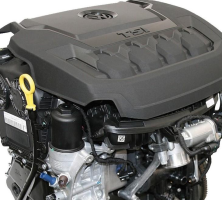
—
Volkswagen Tiguan SUVs allegedly use too much oil due to engine problems caused by the piston rings.
According to the plaintiffs, they must add oil between oil changes to prevent the EA888 engines from stalling and failing. In addition, the plaintiffs assert the Tiguan engine problems can damage components related to the emissions systems.
The lawsuit alleges Volkswagen knew about the Tiguan engine problems before the plaintiffs purchased their vehicles.
But VW argues the 2022-2023 Tiguan class action lawsuit must be dismissed because none of the owners who sued plead facts that his/her Tiguan consumed oil at a rate above what is stated in their owner’s manuals.
VW Tiguan Engine Problems
Multiple class actions were filed alleging VW Tiguan owners must add oil between scheduled oil changes, with three class actions consolidated into one: Zeiders and Calvin Westlund v. Volkswagen, Maria Lydia Martinez v. Volkswagen, and Scott Worthington v. Volkswagen.
The consolidated lawsuit filed by seven Tiguan owners alleges the engine problems are caused by defective piston rings which don’t have enough tension. The plaintiffs contend engine oil should be separated from the combustion cycle but isn’t.
The VW Tiguan engine problems are also allegedly caused by the positive crankshaft ventilation (PCV) systems which fail to reduce pressure within the crankcase.
The lawsuit references a 2024 technical service bulletin (2017813/19) titled, “17-18-06 – Oil Consumption Measurement.” The bulletin was issued in the event a vehicle owner told a dealer that the oil consumption was higher than the “Volkswagen oil consumption standard of up to 0.5 quarts per 600 miles, or 0.5 liters per 1000 km.”
Volkswagen dealers are instructed to perform a three-step oil consumption text to verify if the Tiguan is using too much oil. However, some of the owners who filed the Tiguan class action say they filed the lawsuit while dealers were in the middle of performing their oil consumption tests.
VW Tiguan Engine Problems — Motion to Dismiss the Lawsuit
According to Volkswagen, no plaintiff complains their Tiguan engine stalled, failed or damaged any emission components due to oil consumption. The automaker argues all the plaintiffs “parrot the same generalized allegation that they were prompted by the vehicles’ oil warning light to add oil to the vehicle in between scheduled oil changes.”
And VW says the plaintiffs do not plead any facts showing their Tiguans ever experienced “excessive oil consumption.”
According to Volkswagen’s motion to dismiss:
“Plaintiffs plead no facts establishing (i) what they claim their vehicles’ oil consumption was supposed to be, (ii) what it actually was at any given time, 3 (iii) how much oil was in their vehicles’ engines at the time they allegedly had to top it off or add more, or (iv) that any of their vehicles ever consumed oil at a rate that contravened any applicable law, standard, or statement in their vehicles’ Owners’ Manuals….”
One plaintiff does complain her Tiguan engine experienced some “sputtering” and “hesitation” one month after her purchase in October 2021, but she admits dealership technicians inspected her Tiguan and found it to be safe and operating normally.
VW also argues the plaintiff does not allege any of it was connected to any supposed oil consumption problem. In fact, VW says the plaintiff does not claim to have noticed any oil consumption issues until March 2024.
Volkswagen also told the judge about the Tiguan owner’s manuals which specifically say, “engine oil consumption can vary from engine to engine and can change throughout the service life of the engine,” and “[d]epending on the driving style and the usage conditions, the engine oil consumption can be up to 1 liter (1 quart) per 1200 miles (2000 kilometers)….”
No plaintiff has allegedly established that their Tiguan consumed oil at a rate in excess of that stated in their owner’s manuals. And while the SUV owners complain they must add oil, Volkswagen argues they have nothing to complain about.
VW then references the owner’s manuals which say, “the engine oil level must be checked regularly,” and the manuals provide instructions on how to top off the oil levels as necessary in between recommended oil change intervals.
“Even the applicable Warranty and Maintenance Booklets, which also accompanied the sale of Plaintiffs’ vehicles, recommend that owners check the oil level at each gas filling.” — VW’s motion to dismiss
Volkswagen notes how the plaintiffs have driven their Tiguans thousands of miles and haven’t stopped driving them, so claims the vehicles are not merchantable are allegedly false.
VW also told the judge warranty claims must be tossed because the Tiguan warranties cover only defects in “materials and workmanship,” but courts hold the warranties do not cover “design defects” which the plaintiffs allegedly claim in the class action.
And although the plaintiffs want the judge to force Volkswagen to recall the Tiguans, VW argues the judge cannot take over for federal regulators and the Federal Motor Vehicle Safety Act.
In its motion, Volkswagen says the plaintiffs cannot assert “nationwide” claims because the customers allegedly lack standing to represent Tiguan customers in states where no plaintiff resides.
The Volkswagen Tiguan engine class action lawsuit was filed in the U.S. District Court for the District of New Jersey (Newark Vicinage): Zeiders, et al., v. Volkswagen Group of America, Inc.
The plaintiffs are represented by Shub Johns & Holbrook LLP, Sauder Schelkopf, and Lemberg Law, LLC.

